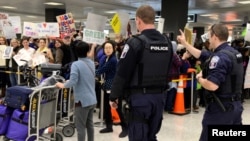A temporary U.S. immigration ban against three African nations is a concern for the entire continent, the outgoing head of the African Union commission said Monday as dozens of African leaders met for an annual summit.
In Africa the ban targets Libya, Somalia, Sudan, predominantly Muslim nations with already complicated, sometimes strained, relations with the United States. The U.S. government does not maintain an embassy in either Libya or Somalia, largely because of safety concerns.
But in a speech before dozens of African leaders at the opening of the African Union summit on Monday, commission chairwoman Nkosazana Dlamini-Zuma said this ban affects all African nations.
“Excellencies, it is clear that globally, we are entering very turbulent times,” she said “... the very country to whom many of our people were taken as slaves during the transatlantic slave trade has now decided to ban refugees from some of our countries. What do we do about this? Indeed, this is one of the greatest challenges to our unity and solidarity.”
The 90-day ban also includes Iran, Iraq, Syria, and Yemen. The seven countries represent about 12 percent of the world's Muslims, and the White House says they are the same countries previously identified by the Obama administration as sources of terror.
The Trump administration says the ban, and a 120 ban on accepting refugees, is in place while U.S. immigration laws and security can be reviewed in order to enhance public safety.
Somalia’s foreign minister Abdisalam Omer told VOA his country is still optimistic about its relations with the United States, it is “too soon” to be concerned about that, he said. But the ban, he said, is worrying.
“We are always sorry to see that people from particularly places where war is being waged now, who are running for their safety, to be told they could not come to the most powerful country in the world, to a country that’s built on refugees and asylum seekers and people who are running from droughts and prosecution and wars and all that,” he said.
“Equally important," he added, "is that one needs to think about international terrorism and how to defeat it, and we need all to come together, not to discriminate against each other.”
Separately, Sudan's Information Minister Ahmed Bilal told VOA's English to Africa service that he sees “no reason” for Sudan to be among those listed as a state sponsor of terror. That label was affixed in 1993 amid concerns about Sudan’s links to Hamas, Hezbollah and al-Qaida, but Sudan’s government says it has recently ramped up its counterterrorism efforts.
Bilal says his country hopes the United States will lift the ban after 90 days. He said he thinks the order will damage the United States "because it will make America almost isolated from the world."
At AU headquarters in Addis Ababa, even nations that don’t have formal relations with the United States, like the disputed Western Sahara territory that claims independence from Morocco, says this affects them. That territory’s ambassador-at-large, Sidi Omar, told VOA the ban is “alarming.”
“As a matter of principle, restrictions should not be made on the basis of religion, or any kind of distinction, as to gender, religion, race or ethnicity,” Omar said. “So that’s really a matter of great concern to us and to, I understand, the larger Muslim community."
Omar said he understands the ban was presented as a measure to "counter terrorism and violent extremism," but he said "extremist elements may actually benefit out of this. And presenting it as something that is anti-Islamic, anti-Muslim ... will feed into the rhetoric that the West is against Islam and so on and so forth.”
And that concern was echoed, indirectly, by new U.N. Secretary General Antonio Guterres, who praised African leaders for accepting refugees, and urged African nations to remain open to those seeking shelter and safety.
When asked by VOA how many refugees might be affected by the U.S. ban, he did not answer, but said that in the future, “I strongly hope that refugee protection will become again high on the agenda of the United States.”












